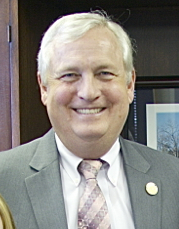Related Research Articles

The Republican Party of Virginia (RPV) is the Virginia chapter of the Republican Party. It is based at the Richard D. Obenshain Center in Richmond in the Commonwealth of Virginia.
Lee Scott Lingamfelter is a retired American politician and soldier. He was a Republican member of the Virginia House of Delegates from 2002 to 2018, representing the 31st district in Fauquier and Prince William Counties, and was a candidate for the 2013 Republican nomination for Lieutenant Governor of Virginia. Lingamfelter lost his reelection bid on November 7, 2017.

The politics of Virginia have followed major historical events and demographic changes in the commonwealth. In the 21st century, the northern region, often referred to as NOVA, an abbreviation for "Northern Virginia," has become more liberal in attitudes and voting, constituting a reliable voting bloc for Democrats. Political orientation varies by region, with the larger cities and suburban areas generally voting Democratic and the rural areas voting Republican. The southern, rural regions have remained rural and conservative.
The 2008 congressional elections in Virginia were held on November 4, 2008 to determine who would represent the Commonwealth of Virginia in the United States House of Representatives, coinciding with the presidential and senatorial elections. Representatives are elected for two-year terms; those elected will serve in the 111th Congress from January 3, 2009 until January 3, 2011.
The following offices were up for election in the United States Commonwealth of Virginia in the November 2009 general election:
Jeffrey M. Frederick is an American politician, CEO, entrepreneur, and craft beer brewery owner. He served three terms as a Republican member of the Virginia House of Delegates. Frederick was also chairman of the Republican Party of Virginia and a member of the Republican National Committee.

Robert Dickson "Bobby" Orrock, Sr. is an American politician. Since 1990 he has been a member of the Virginia House of Delegates, representing the 54th district in the east-central part of the state, including parts of Caroline and Spotsylvania Counties, a county included in the Washington metropolitan area. From 1990–1991 the District encompassed all of Spotsylvania, part of Caroline County, and part of the City of Fredericksburg. From 1992–2001 the District encompassed part of Spotsylvania County and all of the City of Fredericksburg. He is a member of the Republican Party.
The following offices were up for election in the United States Commonwealth of Virginia in the November 5, 2013 general election.

Glenn Ray Davis, Jr. is an American politician from Virginia. Davis is a member of the Republican Party and is currently representing the Virginia House of Delegates 84th district.

The 2016 United States House of Representatives elections in Virginia was held on Election Day, November 8, 2016, to elect the 11 U.S. Representatives from the state of Virginia, one from each of the state's 11 congressional districts. The elections coincided with the 2016 U.S. presidential election, as well as House of Representatives elections, Senate elections and various state and local elections. The primaries were held on June 14.

The Virginia House of Delegates election of 2017 was held on Tuesday, November 7. All 100 seats in the Virginia House of Delegates were contested. The Republican Party held a 66–34 majority in the House of Delegates before the election but lost 15 seats to the Democratic Party, resulting in the Republicans holding a 50–49 advantage. After a recount, the result of the election in the 94th district was called a tie. The candidate to hold the seat was determined by random drawing on January 4, 2018, which resulted in the Republicans holding a 51–49 majority.
Virginia's 31st House of Delegates district election, 2013, held November 5, 2013, was a contest between incumbent Republican Scott Lingamfelter and Democratic challenger Jeremy McPike. McPike ran on the issues of quality of life, transportation, education, and energy. Lingamfelter wanted to streamline government.
Virginia's 31st House of Delegates district election, 2011, held 8 November 2011, was a contest between incumbent Republican Scott Lingamfelter and Democratic challenger Roy Coffey. Coffey argued that legislators should concentrate on spending money on people rather than industries. Lingamfelter argued, "Our nation is in peril. There are people that believe today that the constitution is nothing more than a nice collection of suggestions. Folks, the constitution is not a collection of suggestions it is the law of this land."
Virginia's 31st House of Delegates district election, 2007, held November 6, 2007, was a contest between incumbent Republican Scott Lingamfelter and Democratic challenger Bill Day, a part-time psychotherapist, in the 2007 general election which was scheduled for October 6. Day began sending out mass mailings shortly after Labor Day introducing himself to the voters, and in October began sending out negative advertisements against Lingamfelter, accusing him of being aligned with southern Virginia Republicans who were failing to address northern Virginia traffic congestion.
Virginia's 31st House of Delegates district election, 2003, held 4 November 2003, was a contest between incumbent Republican Scott Lingamfelter and Democratic challenger David G. Brickley, who had served as director of the Virginia Department of Conservation and Recreation under Governor James S. Gilmore III.

Elizabeth R. Guzmán is a Peruvian-American politician and social worker elected to represent Virginia's 31st House of Delegates district in Virginia's House of Delegates. Guzmán also works as a Court Appointed Service Advocate for CASA CIS to prevent child abuse. She serves on the House committees on Privileges and Elections and Cities, Counties, and Towns.

Hala Ayala is an American cybersecurity specialist and politician representing the 51st district in the Virginia House of Delegates. She is a Democratic candidate in the 2021 Virginia lieutenant gubernatorial election.
Kathy Tran is an American politician who currently serves in the Virginia House of Delegates. A Democrat, she has represented the 42nd House of Delegates district since 2018.

The 2019 Virginia House of Delegates election was held on November 5, 2019, concurrently with the elections for the Senate of Virginia, to elect members to the 161st Virginia General Assembly. All 100 seats in the Virginia House of Delegates were up for election. It resulted in Democrats gaining 6 seats in the House of Delegates, and gaining control of both chambers of the General Assembly, marking the first time that Democrats held control of both legislative and executive branches in Virginia since 1993.

The 160th Virginia General Assembly, consisting of members who were elected in both the 2017 House election and 2015 Senate election, convened on January 9, 2018. Republicans held one-seat majorities in both chambers, losing 17 seats in the House.
References
- ↑ Rein, Lisa (2001-11-01). "Ex-Colonels Square Off To Contest New Seat". The Washington Post. Retrieved 2017-04-01.
- ↑ By R.H. Melton (2001-07-29). "Anti-Tax Candidates Shake GOP in N.Va". The Washington Post. Retrieved 2017-04-01.
- ↑ "2001 House of Delegates Republican Primary District 31". Virginia Department of Elections.
- ↑ "2001 House of Delegates General Election District 31". Virginia Department of Elections.
| This Virginia elections-related article is a stub. You can help Wikipedia by expanding it. |